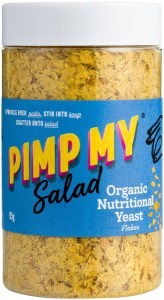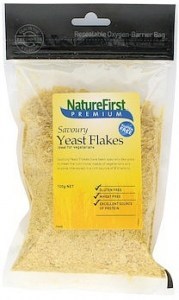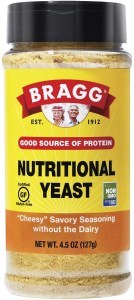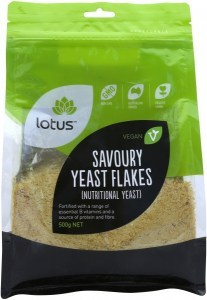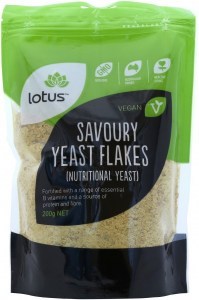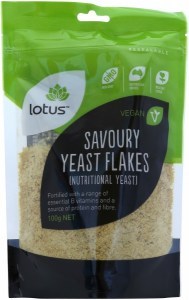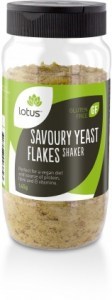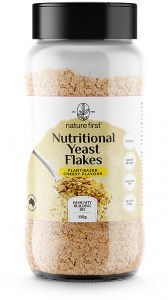Nutritional yeast is a popular health food that’s high in nutrients, with a umami flavour akin to cheese (much to the delight of any vegans out there who miss the taste of this dairy-favourite).
Lauded by plant-based foodies everywhere, if you’re not sprinkling this gold dust on your food you’re missing out on a slew of nutrients and a flavour that will fast become your favoured seasoning. True to its name, nutritional yeast contains loads of nutrition; it’s brimming with protein, vitamins, minerals, and antioxidants. Considered a complete protein, nutritional yeast contains all nine essential amino acids, which is great news for vegans since meat is the most common source of complete protein.
Nutritional yeast is the kind of health food you inevitably end up adding to every meal. Because it’s so good for you and so delicious, why not?
What is Nutritional Yeast?
Nutritional yeast, or Saccharomyces cerevisiae as it’s known in the science world, is a special type of yeast used by vegans (and health-foodies in the know) everywhere. It’s made from the same yeast used to make bakers and brewers yeast but the finished product is quite different. Both brewers and bakers yeast is ‘activated’ whereas nutritional yeast is deactivated in the production process. Yeast cells are cultured for several days on a sugary medium such as molasses, deactivated using heat and harvested as a food product.
Nutritional yeast comes in two varieties: fortified and unfortified. Fortified nutritional yeast contains extra vitamins and minerals added post-harvest while unfortified nutritional yeast is au-natural and contains only the vitamins and minerals contained in the yeast itself.
The most common form of nutritional yeast is flakes, though it can also be found as a powder and granules as well.
As for its flavour, well this is where nutritional yeast shines. It has a distinct cheese-like flavour - making anything you choose to sprinkle it on/in taste like cheese. Some describe it as slightly nutty, others a umami taste. The bottom line is, it has an uncanny ability to compliment just about any savoury dish.
Those who’ve been privy to nutritional yeast’s power to turn boring vegan food into great vegan food may know it by its street name, ‘nooch’. Now a mainstay in the health food world, nutritional yeast has broken the vegan barrier and made its way into most foodies’ pantries.
But not just for the borderline-addictive taste. Boasting a slew of nutrients and associated health benefits as an added bonus, the taste is almost a happy accident. Nutritional yeast is packed with protein, vitamins and minerals as well as antioxidants glutathione and selenomethionine and beta-glucan, a type of fibre.
One of the main reasons nutritional yeast is a staple in just about every vegan’s pantry is for its B vitamin content, including B vitamins typically derived from meat products. Fortified versions can include B1 and B2, niacin (B3), folate (B9) and vitamins B6 and B12 and more.
With nutrients comes their associated health benefits, and nutritional yeast has lots. Here’s a look at some of the health benefits of nutritional yeast.
Health Benefits of Nutritional Yeast
Considered a complete protein
Containing all nine essential amino acids, nutritional yeast is considered a complete protein. This means it’s a fantastic way for anyone on a plant-based / vegan diet to consume good quality, meant-free protein. One tablespoon of nutritional yeast is said to contain around two grams of protein.
It’s a meat-free source of B12
Typically derived from animal products, some vegans can struggle to get the recommended daily intake of B12. B12 helps us maintain a healthy nervous system, working alongside iron to aid red blood cell production. Nutritional yeast may be a good addition to plant-based diets since it contains B12 along with a host of other B vitamins.
It contains an important soluble fibre
Nutritional yeast contains a type of soluble fibre called beta-glucan. It’s a super fibre of sorts, containing a long list of functional and bioactive properties. Fibre is your gut’s best friend and this one might just come with some extra benefits your whole body will love. Beta-glucan is extensively studied, most notably for its potential positive effects on cholesterol levels. This has led industry experts to believe nutritional yeast may be beneficial in maintaining healthy cholesterol levels.
It’s loaded with antioxidants
Nutritional Yeast contains two important antioxidants: glutathione and selenomethionine. These powerful antioxidants are known for their protective properties, helping your body fight against free radical damage while cleansing the body to aid elimination of toxins. If you’re on the lookout for foods high in antioxidants, nutritional yeast may just be the health food you’ve been looking for.
What can Nutritional Yeast be used for?
Thanks to its natural affinity to a umami, cheese-like flavour, nutritional yeast goes well with just about anything savoury. Vegan or not, adding a spoonful of these flavourful flakes can transform any savoury dish from blah to brilliant.
There are literally hundreds of ways you can use nutritional yeast, but if you’re just getting started, here’s a few simple suggestions of how to incorporate this flavour-packed powerhouse into your daily menu.
Sprinkle nutritional yeast on vegetables for extra flavour and nutrients; create a creamy vegan pasta sauce by combining it with cashews, oat milk and fresh herbs in a blender; use in mashed potato for the best mash you’ve ever tasted; add a spoonful to savoury baking, think tart bases, homemade crackers, bread and scones; season popcorn; make ‘cheesy’ kale chips; add to soups and stews; incorporate in home-made dressings for a salad like no other.
Nutrition
It’s not called nutritional yeast by accident. This gold dust not only tastes great - and is an excellent cheese-flavour alternative for vegans - it’s also full of good-for-you nutrition.
But not all products are created equal.
The nutrition inside varies by product and by brand. Some brands package unfortified nutritional yeast while others fortify their product with ingredients like folic acid, riboflavin (B2) and other vitamins and minerals. No matter the brand, whether fortified or unfortified, nutritional yeast contains an impressive amount of nutrition.
The following nutrition information is for Lotus Yeast Flakes:
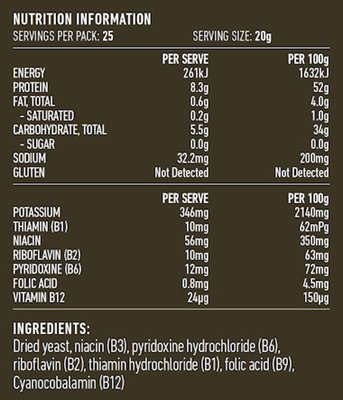
Micronutrients are essential nutrients, not made by the body but necessary for proper function. That means we must obtain them from foods we eat or we risk deficiency.
Like many, Lotus Yeast Flakes are fortified. Fortified nutritional yeast comes with the added benefit of micronutrients. For Lotus, these include B vitamins like niacin (B3), pyridoxine hydrochloride (B6), riboflavin (B2), thiamin hydrochloride (B1), folic acid (B9), cyanocobalamin (B12), and potassium.
Conclusion
Nutritional yeast is a nutrient packed yeast product used to enhance savoury dishes or create cheese-alternatives. Well known in the vegan world, non-vegans are starting to catch on to the beneficial nutrients and delicious flavour. Nutritional yeast is much the same as bakers and brewers yeast but with more nutrients. It typically comes in two varieties, fortified and unfortified. Unfortified nutritional yeast contains a healthy dose of vitamins and minerals but fortified nutritional yeast contains a higher nutrient content with micronutrient in there as well. Like all highly nutritious foods, nutritional yeast comes with several potential health benefits. It’s high in antioxidants, protein and fibre and is a plant-based source of essential B vitamins including B12. Nutritional yeast is easy to use and quite versatile, adding a delicious umami-type flavour to anything you sprinkle it on including pasta, popcorn, soups and more.






